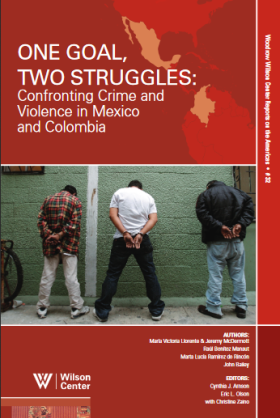One Goal, Two Struggles: Confronting Crime and Violence in Mexico and Colombia (No. 32)



Since the mid-2000s, violence related to drug trafficking and other transnational crime has increased exponentially in Mexico. By the end of the decade the public began to seriously doubt the government’s strategy and its ability to guarantee public safety. The nature and intensity of violence in Mexico brought forth memories of the 1980s and ’90s in Colombia, when the country was besieged by the Medellín and Cali drug cartels.
Over the course of more than a decade, Colombia’s security situation has improved dramatically; it has become an “exporter” of security expertise and has trained thousands of military and police personnel in Mexico, Central and South America, and the Caribbean as well as around the world.
What aspects of Colombia’s strategy and tactics for fighting organized crime in its own territory offer useful lessons for Mexico? What might Colombia’s steps and missteps offer by way of example or counter-example? What is unique about each case such that comparisons are misleading? What do current security challenges in Colombia suggest about the threat posed by organized crime more generally?
In One Goal, Two Struggles: Confronting Crime and Violence in Mexico and Colombia, international experts address the utility of comparing Colombia and Mexico’s experiences and strategy for combatting organized crime and violence more generally.
Authors


Researcher, Center for Research on North America, National Autonomous University of Mexico (UNAM)


Director of Policy and Strategic Initiatives, Seattle International Foundation


Latin America Program
The Wilson Center’s prestigious Latin America Program provides non-partisan expertise to a broad community of decision makers in the United States and Latin America on critical policy issues facing the Hemisphere. The Program provides insightful and actionable research for policymakers, private sector leaders, journalists, and public intellectuals in the United States and Latin America. To bridge the gap between scholarship and policy action, it fosters new inquiry, sponsors high-level public and private meetings among multiple stakeholders, and explores policy options to improve outcomes for citizens throughout the Americas. Drawing on the Wilson Center’s strength as the nation’s key non-partisan policy forum, the Program serves as a trusted source of analysis and a vital point of contact between the worlds of scholarship and action. Read more


Mexico Institute
The Mexico Institute seeks to improve understanding, communication, and cooperation between Mexico and the United States by promoting original research, encouraging public discussion, and proposing policy options for enhancing the bilateral relationship. A binational Advisory Board, chaired by Luis Téllez and Earl Anthony Wayne, oversees the work of the Mexico Institute. Read more

Explore More
Browse Insights & Analysis
Iraq Should Consider Extending UNAMI’s Mission


